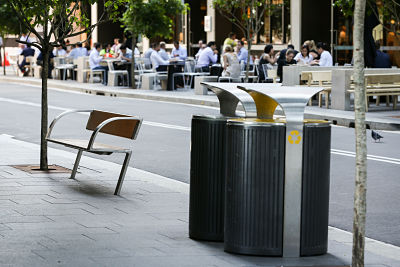By Julian Bajkowski
Canberra is best known as the home of federal government, however the Australian Capital Territory’s own looming election has thrown up a distinctly local policy issue that transcends partisan brands: rubbish bins.
In a curious turn of ideology, Canberra’s Liberal Party opposition has pledged to stage a market intervention in the local waste economy by issuing green wheelie bins for garden refuse so Southern Territorians can be spared the the chore of dragging trailers of leaves to existing privately operated organic tips.
The proposed move to impose central government control over the disposal of lawn clippings would come in the form of a public-private partnership (PPP) according to Canberra Liberals leader Zed Seselja.
The essentially local policy comes as the ACT Liberals seek to win votes using a back-to-basics campaign that aims to differentiate their party by running on municipal issues rather than bigger picture causes.
Although outwardly simple, the rollout of green bins is a difficult issue to negotiated because of Canberra’s changing demographics and revenue raising challenges. A fundamental problem is that the ACT essentially remains a sub-scale economy of under 350,000 people that is economically dependent on the Commonwealth Public Service.
One way of offsetting the ACT’s relatively low population base coupled with high administration costs has been to sweat the local residential property market by rapidly approving the unpopular redevelopment of older inner-city suburbs into apartment compounds that yield the maximum number of titles.
Many Canberra residents feel that the redevelopment belts of single and double bedroom flats are intended to maximise the ability to collect rates by appealing to property investors and pre-family renters willing to pay prices on-par with those in Sydney.
A key challenge in selling the green wheelie-bin concept is that many apartment dwellers have chosen to forgo gardens and have no need for a dedicated bin, much less the inclination to pay for one, at a time when services like public health and transport are struggling.
At the same time dwellers in traditional houses have for decades used backyard compost heaps to turn one season’s excess plant matter into the next’s fertiser.
There are also fears that an apartment bubble has been created and that the property market could implode if he Coalition wins a future federal election and fulfils its promise to reduce public service numbers and decentralise admininistration away from Canberra.
But perhaps the hardest sell for a government imposed green waste scheme will be the difficult job of convincing the private sector investors that a government intervention in an established market has merit.
Experience has also taught commercial property developers to be highly cautious about doing business in the National Capital in an election year.
During the run up to the last Territory election, Mr Seselja successfully campaigned against a proposed $2 billion tri-generation powered data centre in Tuggeranong that had been intended to address a critical shortage of local power and federal computing capacity.
The ACT goes to the polls on 20th October 2012.
Comment below to have your say on this story.
If you have a news story or tip-off, get in touch at editorial@governmentnews.com.au.
Sign up to the Government News newsletter

